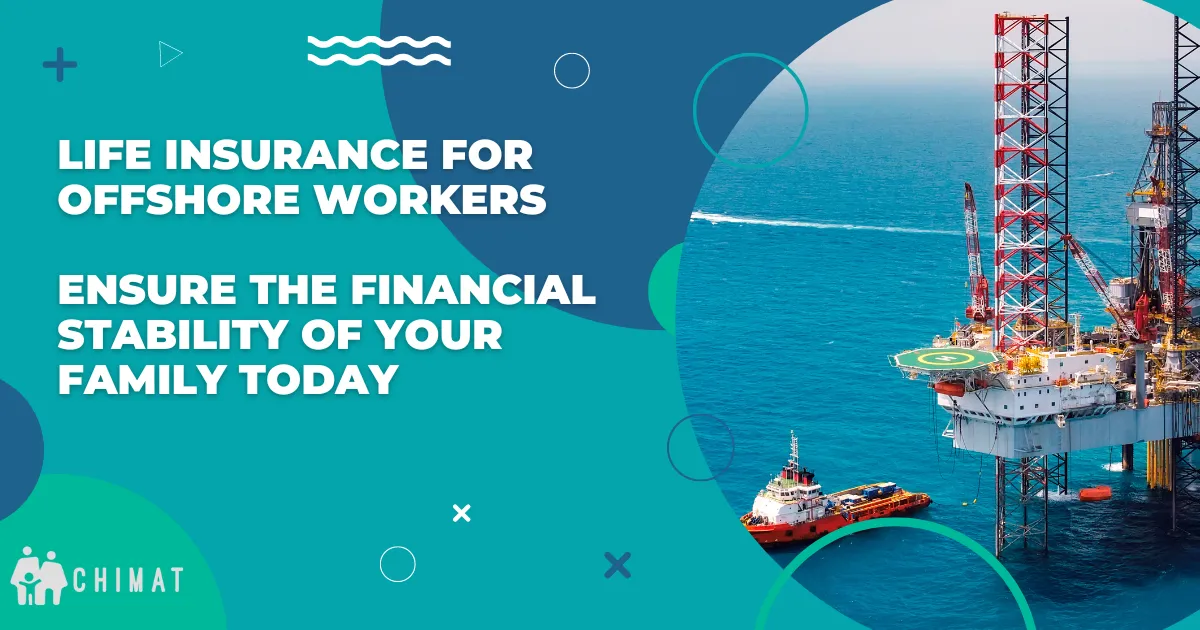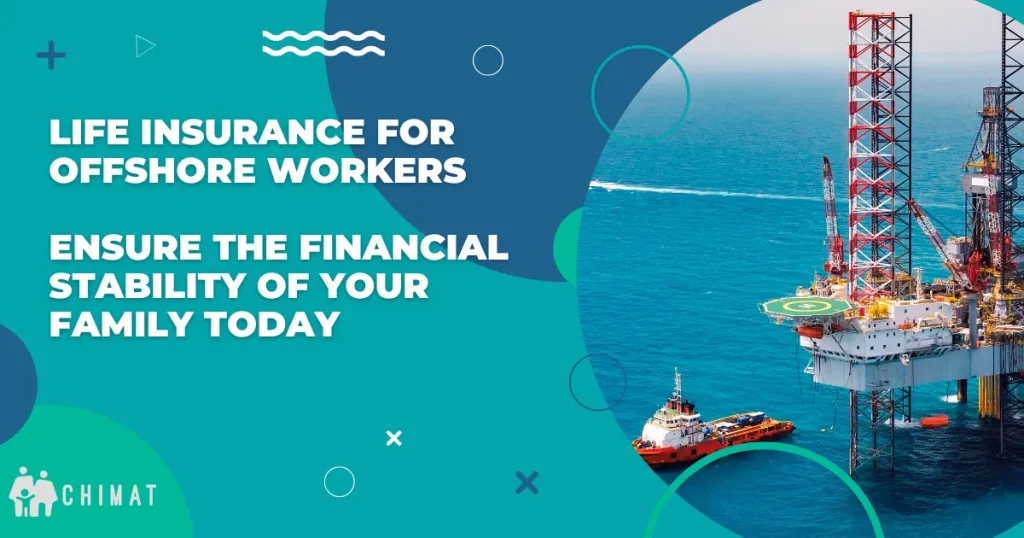
Did you know the UK oil and gas industry helps 280,000 jobs? It’s a key player in a risky world. Offshore workers need life insurance to keep them and their families safe.
This guide goes deep into maritime life cover. It gives crucial facts for rig workers looking for assurance.
Workers face many dangers, such as risky helicopter flights and harsh weather, so having the right life insurance is a must.
When looking at life cover for offshore work, you’ll see not all plans are the same. Some insurers might avoid covering oil rig or gas workers because they think it’s too risky.
Luckily, Chimat has access to insurers offering the proper coverage. They know what those working at sea need and offer plans, especially for them.
Some important points to consider:
- The UK oil and gas industry supports 280,000 jobs, highlighting the need for specialised life insurance.
- Offshore work involves unique risks, necessitating tailored life insurance policies.
- Specialist insurers offer coverage for high-risk maritime occupations often excluded by standard providers.
- Understanding policy terms and exclusions is crucial for offshore workers seeking comprehensive coverage.
- Maritime life cover options vary based on job role, location, and shift patterns.
Life Coverage Whatever Your Occupation – Get Your Cheapest Quotes Within Minutes

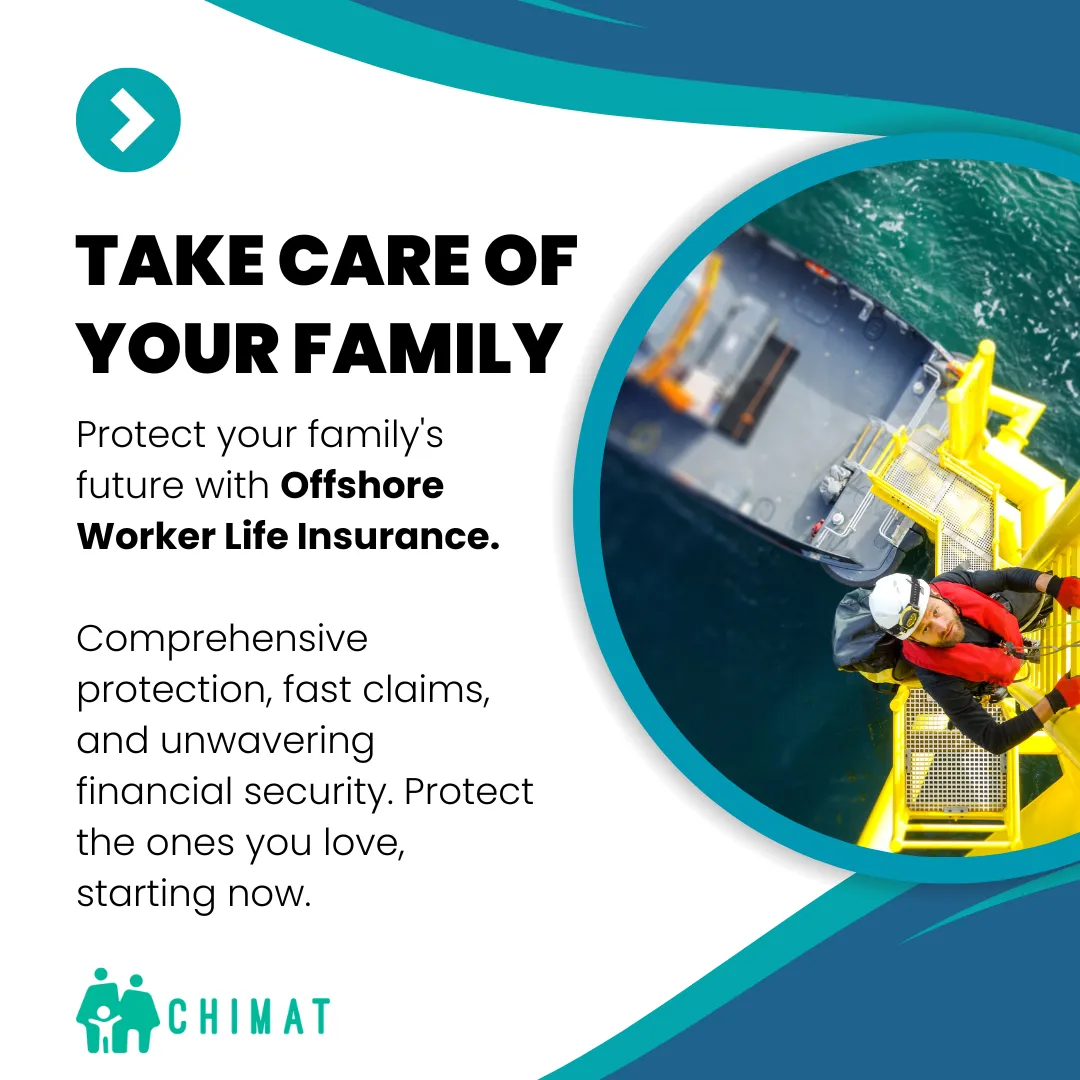
Understanding the Importance of Life Insurance for Offshore Workers
Working offshore has its own set of challenges and dangers. For those in the maritime field, getting life insurance is key.
It helps protect your family’s future. Marine life policies are vital for offshore workers. Let’s look into why and what to consider.
The Unique Risks in Offshore Industries
Offshore work means facing more dangers than typical jobs. You may deal with risky tasks or machinery. Your job’s risk level can vary. It depends on whether you’re an office worker or a diver.
- Job roles can change how much you pay for insurance.
- Insurers look at how often you work offshore.
- The places you work in matter, too.
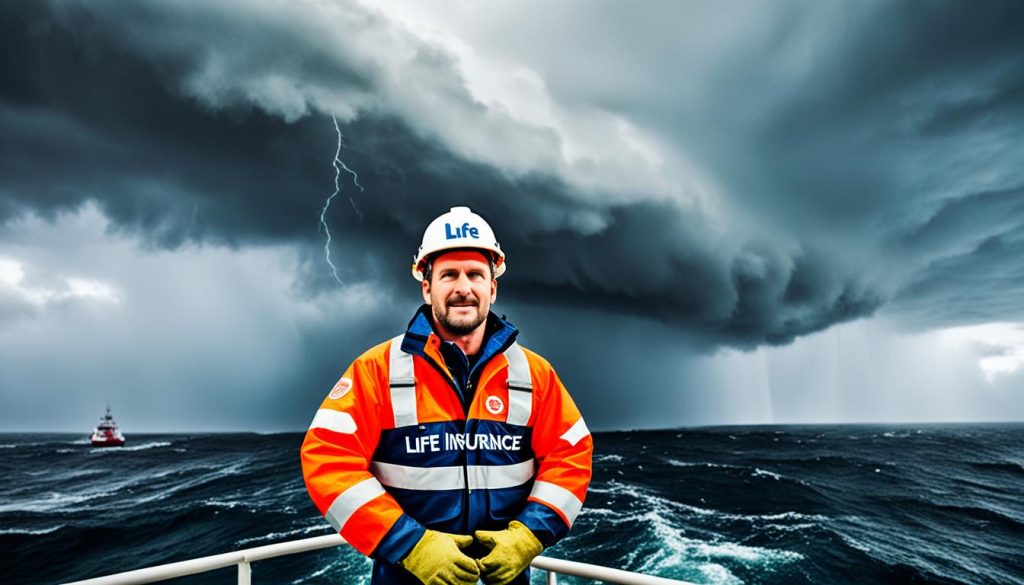
Peace of Mind for Families of Maritime Professionals
If the worst happens and you pass away, offshore life insurance gives your family a tax-free sum.
This covers accidents at work and the journey to your work site. Given the risks of working offshore, this financial safety net is priceless.
Click To Compare QuotesLife insurance brings comfort to families. It ensures their financial future in hard times.
| Policy Type | Maximum Cover | Maximum Term |
|---|---|---|
| Level Term | £1,000,000 | 40 years |
| Decreasing Term | £1,000,000 | 40 years |
| Whole of Life | £1,000,000 | Lifetime |
| Over 50s Plan | £20,000 | Lifetime |
For a 34-year-old working offshore, a full insurance plan can cost around £18 each month.
This includes life insurance and other coverage for critical illnesses and lost income. It would offer £500,000 cover for 20 years and a monthly £3,000 income for two years.
Types of Life Insurance Policies for Offshore Workers
Choosing the right life insurance is key if you work offshore in industries like oil and gas. You face more risks than most, so making the right policy is vital for your family.
Let’s look at the main life insurance types for workers at sea.
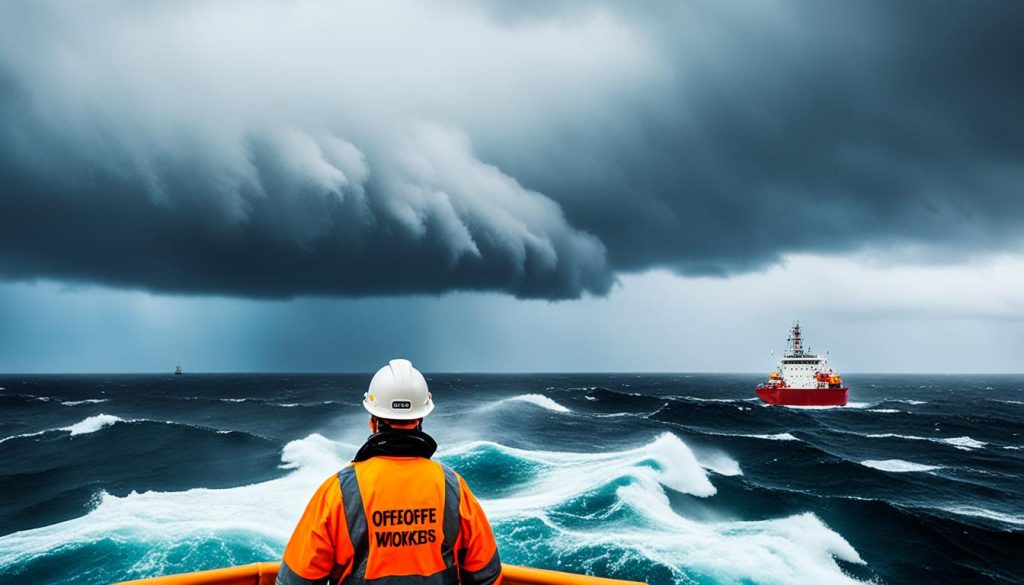
Level Term Life Insurance
Level term life insurance gives a set amount for a specific time, often up to 40 years. You pick the amount and time.
It’s perfect if you need steady protection on your offshore journey. The payout stays the same for the whole term.
Decreasing Term Life Insurance
This insurance’s payout decreases over the term. It’s great for covering decreasing debts, like mortgages.
As your debt lessens, so does the cover amount. It’s usually cheaper than level term insurance.
Whole of Life Insurance
Whole of life insurance covers you forever. It pays out when you die, no matter when.
Premiums are higher than for fixed-term policies but give lifelong peace of mind in the oil and gas world.
Over 50s Plans
Designed for those aged 50 to 85, over-50s plans guarantee acceptance; no health checks are needed.
They offer smaller payouts, up to £25,000, which is good for easing funeral costs or leaving a small legacy.
| Policy Type | Key Features | Best For |
|---|---|---|
| Level Term | Fixed payout, set term | Consistent protection needs |
| Decreasing Term | Reducing payout, set term | Mortgage coverage |
| Whole of Life | Lifelong coverage, guaranteed payout | Permanent protection |
| Over 50s Plans | Guaranteed acceptance, no medical checks | For older offshore workers, funeral costs |
When considering life insurance for offshore work, consider what you need, can pay for, and your long-term plans.
Click To Compare QuotesConsider the unique risks of your job. Getting advice from experts can help you find the best fit.
Factors Affecting Offshore Workers Life Insurance Premiums
Many things impact your cost when you look for life insurance for offshore work or rig duties. Knowing these can help you find lower premiums for your offshore worker’s life cover.
Your premium is based largely on age, health, and smoking habits.
Generally, young, healthy non-smokers pay less. Also, the kind of work you do plays a big part.
- Job role and specific duties
- Industry type (oil, gas, navy, fishing)
- Percentage of occupation classed as high-risk
- Equipment used
- Qualifications held
If your job is high-risk, you might pay more. For example, an offshore drilling boss pays different rates to an office worker.
Also, where you work matters; places like the North Sea or parts of Africa can increase your premium.
“In the UK, a child loses a parent every 22 minutes. This stark reality underscores the importance of life insurance for offshore workers’ families.”
How often you work at sea affects your premium, too. A four-week on-and-four-week-off shift might look different to insurance companies than other schedules.
| Occupation | Location | Life Insurance (£150,000 over 20 years) | Life and Critical Illness Cover |
|---|---|---|---|
| Drilling Supervisor | North Sea | £7.31 | £30.34 |
| Rope Access Technician | Angola | £33.40 – £59.48 | £56.43 – £82.51 |
While risky jobs can mean higher premiums, lower-risk offshore jobs might get regular prices.
It’s important to look around for insurers who know about maritime and rig worker insurance.
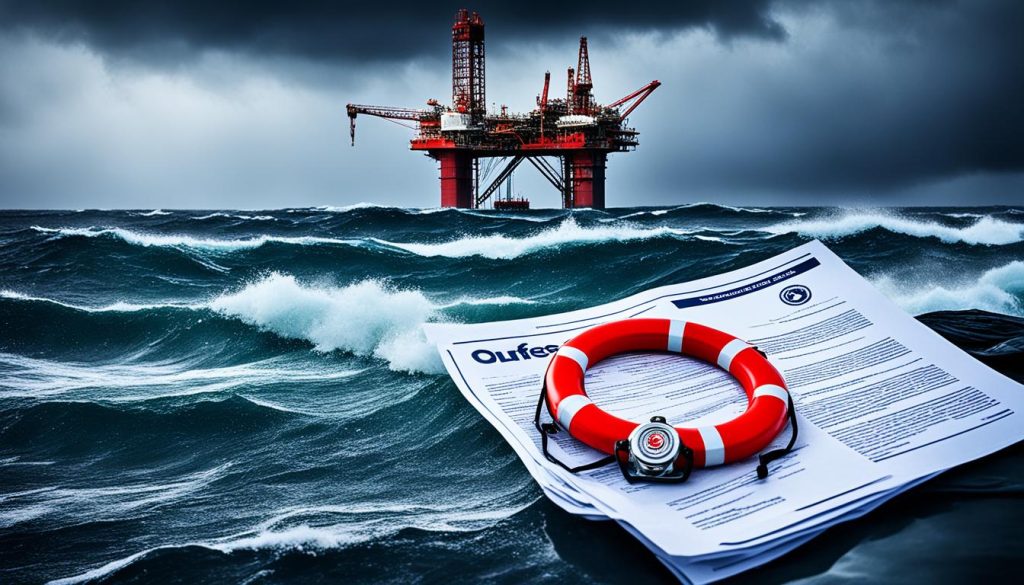
Critical Illness Cover for Maritime Professionals
For those in maritime jobs, critical illness coverage is very important. It protects you financially if you get a serious health issue.
This could affect your job and how you make a living.
Common Exclusions in Offshore Worker Policies
Offshore life insurance can have some rules to be aware of:
- Total and permanent disability
- Accidents related to helicopter travel
- Occupation-specific incidents
The rules can change depending on what you do and how much risk your job carries. For example, the rules might be stricter if you work with dangerous materials or at great heights.
Benefits of Critical Illness Cover
If you get a health issue from a list your insurer gives, they’ll pay you a lump sum. If you’re too ill to work, this can significantly help with money.
Critical illnesses might include:
- Cancer
- Heart attack
- Stroke
- Loss of limbs
- Hearing or sight loss
- Permanent disability
Combining Life Insurance and Critical Illness Cover
Having both life and critical illness cover is a great choice. It ensures your family gets help if anything happens to you, including if you pass away or can’t work due to a serious illness.
| Coverage Type | Life Insurance | Critical Illness Cover |
|---|---|---|
| Payout Trigger | Death | Diagnosis of specified illness |
| Benefit | Lump sum to beneficiaries | Lump sum to the policyholder |
| Primary Use | Family financial protection | Medical costs and income replacement |
Important reminder: the rules and who can get these policies might change for different maritime jobs. Speaking with experts in offshore and marine insurance can help you pick the best coverage.
The Application Process
Getting offshore workers’ life insurance is a step-by-step process. You must detail your work in the oil and gas world. This way, you make sure your coverage fits your situation exactly.
- Your job’s specific roles and what you do
- Health history and current condition
- Details about age, lifestyle, and if you smoke
- Work qualifications that matter
- About your job’s risks and dangers
They might ask for more details to understand your job’s risks better. Being honest and detailed is key to getting the right coverage and avoiding issues when making claims later.
For oil and gas life insurance, you might need to say:
- About the offshore places you work at
- When you go on and off from work
- Safeguards and steps for emergencies
- Any special training you’ve done
Every insurer is different. Some may have special plans for risky jobs like yours. It’s smart to talk to experts on maritime jobs’ insurance needs.
“Approximately 75% of Offshore Technicians specialise in mechanical, electrical, or instrumentation roles, highlighting the diverse skill set required in the industry.”
The application might be long, but it’s for your own good. Providing complete, detailed information helps us pick the right policy for you, which is key for offshore workers like you.
Comparing Insurance Providers for the Best Offshore Coverage
Choosing the right insurance if you work offshore can be tough. The risks are unique, so not all insurers fit your needs. You’ll want to find one that understands the challenges you face.
Specialised Insurers for High-Risk Occupations
There are insurance companies that focus on high-risk jobs such as offshore work. These insurers understand the unique risks and may offer better deals.
Click To Compare QuotesThey understand what you need in maritime life cover.
- Tailored policies for offshore risks
- Better understanding of industry hazards
- More competitive premiums for rig worker life assurance
The Importance of Expert Advice
Offshore insurance can be complex. Getting advice from an expert in occupation life cover is key. This ensures you pick the right coverage for your situation.
Specialised advisors can help offshore workers find the best protection including life insurance, critical illness cover, and income protection tailored to their occupation.
These experts know the options and can explain policy details. They make it easier to pick what’s best for you.
Cost-Saving Tips for Offshore Workers
There are ways to cut insurance costs for offshore jobs:
- Quit smoking to lower premiums
- Maintain a healthy weight
- Reassess coverage if your job role changes
- Consider higher excess options for private medical insurance
- Regularly compare providers for better deals
If you’ve worked offshore before, you might get cheaper insurance rates. Check your policy now and then to ensure you’re still getting the best deal.
| Insurance Type | Coverage | Benefit |
|---|---|---|
| Income Protection | 50%-70% of pre-tax salary | Financial safety net for extended time off |
| Critical Illness Cover | Lump sum payout | Financial support for diagnosed critical illnesses |
| Life Insurance | Death benefit | Financial protection for family |
Learn about your insurance options and get advice from the experts. This way, you’ll choose the best coverage on and off the rig.
Additional Considerations for Offshore Life Policies
When you choose a marine life policy, think beyond the basics. The policy should fit well with your job and life challenges. Make sure it meets your special needs.
For those working in many places, global coverage is key. Your policy should stay valid no matter where you work, and it is also vital to be able to take it with you when you change jobs.
Click To Compare QuotesAs you grow in your career, you might need more coverage. Find policies that let you change your protection as needed.
Some policies offer extra benefits, like coverage for critical illnesses and income protection.
- Critical illness riders
- Accidental death benefits
- Contractor sickness cover
- Income protection insurance
Check your policy regularly to make sure it’s still right for you. Remember, most policies require at least a 10-year commitment, but you should be able to pay the premiums consistently over time.
Offshore work can increase the risk of serious illnesses. Thankfully, many insurers offer plans that specifically address these risks.
Offshore jobs are ranked by their risk levels.
These rankings can influence your policy details:
| Risk Level | Occupations |
|---|---|
| Low-risk | Cleaner, Cook, Health and Safety Officer |
| Medium-risk | Deck Hand, Mechanic, Rigger |
| High-risk | Bell Diver, Heavy Mechanical Engineer |
Where you work also matters. For example, the UK’s waters are seen as low-risk areas, but places like Afghanistan and Nigeria are high-risk. This can change whether your policy is offered with standard or non-standard terms.
Offshore workers in the UK need life insurance for their safety.
About 70% of them get life insurance from their jobs, which shows that the industry understands its importance. Offshore jobs are risky, with a 20% higher chance of needing life insurance than on land.
Choosing the right life insurance is important for those in the oil and gas sector. They often pick more considerable insurance amounts, around 30% more, because their jobs are more dangerous. When working offshore, there’s a 10% higher chance of dying from an injury.
Life insurance for offshore roles costs about 15% more than for less hazardous jobs. Yet, there are ways to make it more affordable.
Paying upfront yearly can get you a 20% discount with many insurers. You might also get financial news and advice with certain plans.
You can find the best deal by comparing different options and seeking expert guidance. This will keep your family secure and give you peace of mind while you work offshore.
